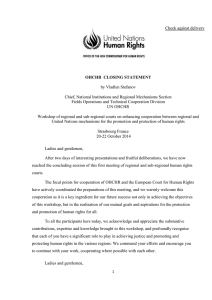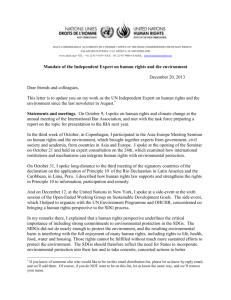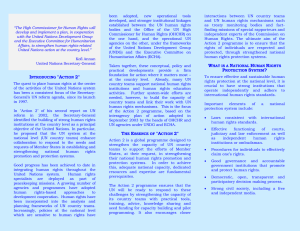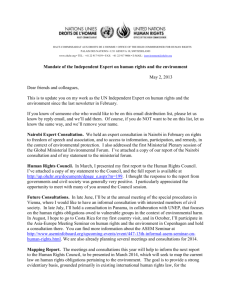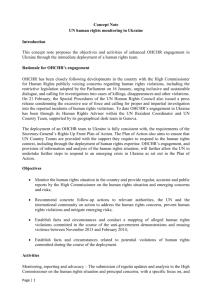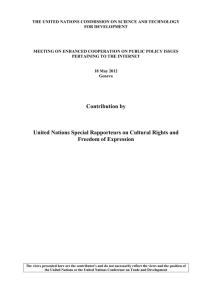Check against delivery International workshop on “Enhancing cooperation between regional
advertisement
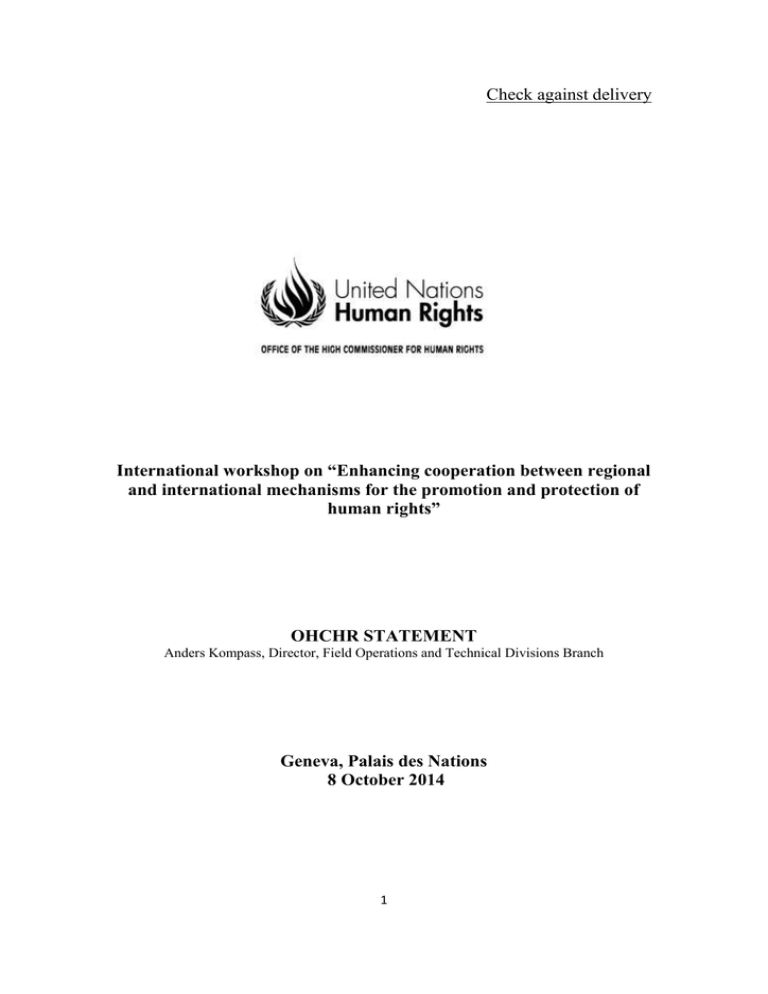
Check against delivery International workshop on “Enhancing cooperation between regional and international mechanisms for the promotion and protection of human rights” OHCHR STATEMENT Anders Kompass, Director, Field Operations and Technical Divisions Branch Geneva, Palais des Nations 8 October 2014 1 Excellencies, Distinguished experts of the United Nations, regional and sub-regional human rights mechanisms, Members of national human rights institutions, representatives of the civil society, delegates, colleagues, ladies and gentlemen, It is a great pleasure for me to welcome you to the Forth International Workshop on Enhancing Cooperation between United Nations and Regional Mechanisms for the Promotion and Protection of Human rights. I am delighted to see here today representatives of mechanisms and institutions from all over the world and I am confident that the diversity of participant’s experiences and expertise will help enrich the discussions on how to further enhance the cooperation between the UN human rights system and regional human rights mechanisms. I would like to express our warm appreciation to the Deputy President of the Human Rights Council, H.E. Ambassador Dilip Sinha, for his participation in this important event. The Human Rights Council has repeatedly recognized, in its resolutions, the important role played by regional human rights arrangements in the promotion and protection of all human rights. I would also like to acknowledge the presence and participation of H.E. Ambassador Bertrand de Crombrugghe, Permanent Representative of Belgium. Belgium is the main sponsor of resolution 24/19 by which the Council requested OHCHR to convene this workshop. Ladies and gentlemen, This workshop was preceded by three similar events held by our Office here in Geneva in 2008, 2010 and 2012. All workshops so far have underscored the need for a more coherent and regular cooperation between regional and international human 2 rights institutions in addition to highlighting the important role of regional human rights mechanisms in promoting and protecting human rights. As a follow up to one of the most important recommendations of the 2010 workshop, focal points for cooperation with the UN were appointed in a number of regional human rights mechanisms. Focal points for cooperation with regional human rights mechanisms were also designated in various divisions and branches of OHCHR: in the Secretariats of Special Procedures, Treaty Bodies, UPR and in the Geographic Sections, to name a few. These focal points have been entrusted with the key role to follow up on the recommendations of our workshops. They were also instrumental in the development of this meeting’s agenda and concept note. I am delighted to inform you that OHCHR will host the second meeting of focal points on cooperation immediately after the workshop, on 10 October 2014. This meeting will be aimed at preparing a work plan to follow up on the recommendations of this workshop and at putting together a concrete road map of cooperation. We encourage you to keep OHCHR informed on examples of best practices on cooperation that that would be useful for other mechanism to learn from. On our side, OHCHR will continue to feed updated information into the network for focal points on cooperation both by email broadcasts and through the recently created web-page on OHCHR’s website. Ladies and gentlemen, Since 2012 workshop, a number of activities aimed at enhancing cooperation between UN and regional mechanisms have been organized by OHCHR. I would like to highlight some of the significant developments and best practices, noting that the first session of the meeting will be devoted to taking stock on developments of cooperation. On 26 September 2013, a Joint Declaration on the reinforcement of co-operation between the Council of Europe Secretariat and OHCHR was signed, defining a general framework for enhancing the co-operation through consultation, participation, exchange of information and, wherever possible, joint activities at the country level 3 through our field presences. The practical modalities of follow-up to the Joint Declaration were discussed in November 2013 at the seventh annual coordination meeting between OHCHR and Council of Europe. On 9 October 2013, the UN High Commissioner for Rights and the OIF SecretaryGeneral renewed the cooperation agreement between OHCHR and OIF for an additional two years (2014-2015). The agreement aims at strengthening cooperation between the two institutions, including providing support for French-speaking countries in the context of the Universal Periodic Review and implementing field projects in such areas of common interest as discrimination, the rule of law and transitional justice. On 15-18 September this year, the UN Working Group on Business and Human Rights convened the first African Regional Forum on Business and Human Rights supported by the African Commission on Human and People’s Rights, the United Nations Economic Commission for Africa and OHCHR. Participants from across Africa called for responsible business practices that respect human rights, provide adequate safeguards to protect against business-related rights abuses, and ensure victims can seek redress. Practical tools adapted to the realities in African countries are expected to be developed aimed at the implementation of the UN Guiding Principles on business and human rights. On the 1 September 2014, the Committee on the Rights of Persons with Disabilities held here in Geneva a one day consultation with regional human rights mechanisms to exchange information to enhance coherence and coordination between this treaty body and similar regional bodies and mechanisms. Although we are pleased to note that various forms of cooperation on several substantive areas have already been put in practice, the implementation of other important recommendations resulting from the workshops on cooperation between UN and regional human rights mechanisms remains a challenge. I would like to invite you to discuss ways and means to overcome those difficulties through a strategic approach to the follow up. Such an approach would prevent fragmentation of promotion and protection, and duplication of efforts and resources. Economic, social 4 and cultural rights, especially those of women and persons with disabilities, will be the vehicle to concretize the discussions at the current workshop, as requested by the Human Rights Council. Ladies and Gentlemen, The program of this workshop reflects the main areas in which cooperation and synergies between UN and regional human rights mechanisms could be enhanced. The first session will focus on taking stock of developments in cooperation between United Nations and regional human rights mechanisms, in particular after the 2012 international workshop. The objective of this session is to share experiences and best practices, including their added value and challenges encountered in their implementation. Discussions will be informed by the 13 recommendations made during the 2012 workshop and will also aim at identifying ways and means to replicate best practices in other mechanisms involved in promoting and protecting economic, social and cultural rights. The second session will focus on mainstreaming economic, social and cultural rights; and also on the role of United Nations, regional, subregional courts and other quasijudicial organs in promoting and protecting economic, social and cultural rights. This session will provide concrete examples of how mechanisms with judicial and quasijudicial competencies can provide protection of economic, social and cultural rights. The third session will deal with economic, social and cultural rights of persons with disabilities and women. The participants will look into the current framework for protecting economic, social and cultural rights of persons with disabilities and women in United Nations and regional human rights systems. They will try to identify gaps and opportunities including through building partnerships with NHRIs and NGOs in promoting and protecting these specific rights. The final session is aimed at defining a way forward on cooperation between United Nations and regional human rights mechanism in promoting and protecting economic, social and cultural rights, using the thematic discussions as a tool to develop specific and succinct proposals of cooperation. Participants will adopt recommendations on 5 these issues at the end of the workshop which will be contained in the report to be submitted to the Human Rights Council in 2014. Let me conclude, ladies and gentlemen, by reiterating that the complementarity between international, regional, and national human rights protection and promotion systems is a great asset. It is through systematic and regular cooperation that we will be able to confront together the many human rights challenges that we face around the world. I wish you productive and fruitful deliberations. Thank you. 6
